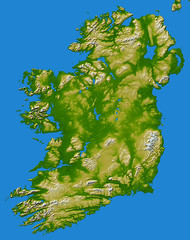 The Genealogical Society of Ireland has teamed up with geneticists in order to come up with the “genetic signature of Irishness”. They are working to build an “Irish DNA atlas”. The main point is to to create a historical resource. The research could, potentially, reveal genes that affect the health of the population of Ireland.
The Genealogical Society of Ireland has teamed up with geneticists in order to come up with the “genetic signature of Irishness”. They are working to build an “Irish DNA atlas”. The main point is to to create a historical resource. The research could, potentially, reveal genes that affect the health of the population of Ireland.
What does it mean to be Irish? Americans who have ancestors who came from Ireland might consider themselves to be Irish, (even if they never so much as set foot onto the Emerald Isle). Everyone, whether of Irish heritage or not, might consider themselves to be Irish on St. Patrick’s Day. It wouldn’t be incorrect, from a political standpoint, to consider everyone who is a citizen of Ireland to be Irish.
There are groups who have joined up in order to find a more clear, scientific, answer to the question. Dr. Gianpiero Cavalleri, a biomedical research lecturer at the Royal College of Surgeons in Ireland, has teamed up with the Genealogical Society of Ireland. They want to build what could be considered as an “Irish DNA atlas”.
The purpose is to construct, and identify, a profile of the typical Irish person. They want to understand what the genetic signature of Irishness is. In order to do that, the researchers are using a combination of genealogy research and DNA samples. The genealogy society will focus on the historical aspects of the information, and the doctors will handle the DNA samples.
Around 100 to 150 people, from all parts of Ireland, will be contributing their DNA. The DNA will be collected by a simple mouth swab. Those who want to participate by giving a sample of their DNA to the study must be able to trace their family tree back to include eight great-grandparents. They also must be able to link their great-grandparents to a small geographical area (of, perhaps, a 30km radius).
Some of the DNA samples could, potentially, lead to disease diagnosis. If so, then the people who contributed their DNA would be informed if there was a genetic issue discovered that they would need to know about for health reasons.
The study could reveal the diversity of the Irish genome. There is potential to connect the DNA to a particular geographical area. Genealogists might be able to use the information from the study to learn more about migration and settlement patterns across Ireland.
Image by Irish Typepad on Flickr

